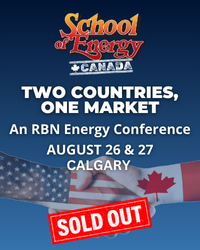Wider price discounts for Western Canadian heavy crude oil have been weighing on its oil producers for the past few months. This appears to be the result of a combination of weak refinery demand, rapidly rising oil production and insufficient oil takeaway capacity from Western Canada. A more permanent solution for wider discounts might be to increase pipeline export capacity to ensure that rising oil production has more options to reach markets. In today’s RBN blog, we consider the pending startup of the Trans Mountain Expansion Project (TMX) as a means to do just that.
Western Canada’s heavy crude oil pricing situation is in a funk once again. In just a few months, the discount for its heavy oil benchmark Western Canadian Select (WCS) at the Alberta trading hub of Hardisty has sunk from a historically tight $10/bbl versus WTI at Cushing, OK, to more than $28/bbl by early November — a near tripling of the discount. When placed in the context of WTI prices that have held between $75/bbl and $85/bbl over the same time span, that additional $15 to $20 discount is taken right off the top for some heavy crude oil producers and has become an all-too-common conversation topic on those same producers’ quarterly earnings calls in recent weeks.
As we discussed in Part 1 of this series, rapid swings and steeper discounts for WCS have happened many times in the past. In that blog, we ran through a recent history of the WCS discount, detailing various issues such as the common problem of rapid production increases of heavy oil from Alberta’s oil sands running up against insufficient pipeline takeaway capacity from Western Canada, with the result that crude oil was often deeply discounted at Hardisty to ensure it could find space on pipelines connecting to other parts of Canada, the U.S. Midwest and the Gulf Coast. At other times, it has been issues such as unexpected outages at large refining centers in the Midwest that sapped demand for heavy oil, leading to larger discounts. On the flip side, when pipeline takeaway capacity increased, such as after the completion of the Enbridge Line 3 Replacement project in October 2021, discounts for heavy oil steadily converged back to a more optimal range between $10/bbl and $15/bbl that we believe to be consistent with the costs of unfettered pipeline transportation and the processing of heavy oil at refineries. Yes, there have been those good news stories for WCS discounts when the complex web linking Western Canada’s oil production, pipeline takeaway capacity and downstream refinery demand — as well as Gulf Coast exports of Canadian heavy oil — was operating as a well-synchronized machine.
Join Backstage Pass to Read Full Article









